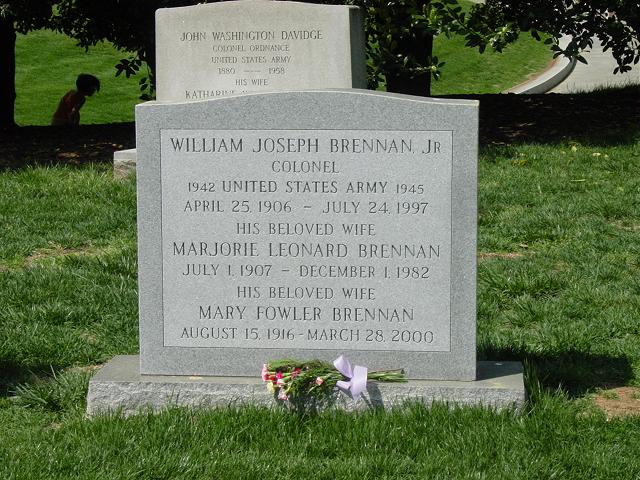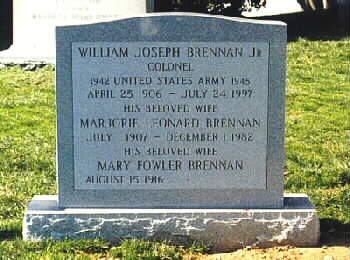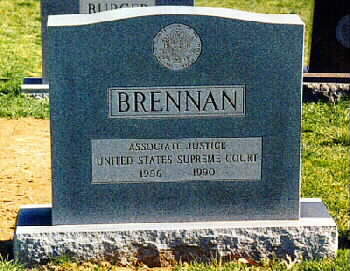“Retired Supreme Court Justice William Brennan, the liberal lion whose intellect and charisma made him one of the most influential jurists in America’s history, died on July 24, 1997. He was 91.
The primary architect of the individual-rights revolution in the law through the 1960s, Brennan died at the Arlington, Va., nursing home where he had been recuperating from a broken hip suffered in November.
Ill health had forced him to retire from the nation’s highest court July 20, 1990. He was nominated for the court by President Dwight Eisenhower in 1956.
Brennan was born in Newark on April 25, 1906, the second of the eight children of an Irish immigrant who started as a laborer but rose through the ranks to become an important labor leader and the city’s commissioner of public safety.
During Brennan’s 34-year tenure on the high court, he wrote more than 1,200 opinions. They shaped the landmark one-person, one-vote principle of political reapportionment, expanded protection against libel lawsuits, defined obscenity and broadened the rights of any person — including the poor, mentally handicapped or imprisoned — to battle the government in court.
In the high court’s history, only William O. Douglas wrote more opinions.
President Clinton called Brennan a remarkable human being and said, “His devotion to the Bill of Rights inspired millions of Americans and countless young law students, including myself.”
Chief Justice William Rehnquist said, “He played a major role in shaping American constitutional law. He was also a warm-hearted colleague.”
Many conservatives called Brennan an ideologue and an activist. Most liberals called him a hero.
“The most outstanding justice of our century,” said John Gibbons, a Seton Hall University law professor.
New York University law Prof. Burt Neuborne called Brennan the most influential Supreme Court member since John Marshall, the great chief justice of the early 1800s.
Brennan was a consistent supporter of abortion rights and of expanding the rights of individuals often forgotten by society — prison inmates, welfare recipients and the mentally handicapped, among others.
He was an outspoken opponent of the death penalty under all circumstances.
Brennan also played major roles in Supreme Court decisions that required busing to desegregate public schools, banned officially sponsored prayers and Bible readings from public schools and enhanced free-speech and free-press rights.
He also was an avid supporter of affirmative action to atone for discrimination against racial minorities and women.”
Justice Brennan was laid to rest in Section 5 of Arlington National Cemetery, next to his wife Marjorie. He is also buried near Justices William O. Douglas, Oliver Wendell Holmes, Jr., Potter Stewart and Thurgood Marshall.
Mary Fowler Brennan
Was Secretary, Later Wife to Supreme Court Justice
Friday, March 31, 2000
Mary Fowler Brennan, 83, the longtime secretary and later the wife of the late Supreme Court Justice William J. Brennan, died of complications from cancer March 28 at Arlington Hospital. She lived in Crystal City, Virginia.
She had been Brennan’s secretary for a little more than 25 years when the couple married in a private ceremony in 1983, a few months after the death of his first wife, Marjorie Leonard, to whom he was married for 54 years.
Brennan’s second marriage surprised Supreme Court colleagues, who learned of the union in a brief office memo that simply read, “Mary Fowler and I were married yesterday and we have gone to Bermuda.”
She resigned that day after 40 years with the Supreme Court.
Described as warm, friendly and fiercely loyal to the justice, Mrs. Brennan was known for her sense of humor and the professionalism and efficiency with which she ran his office.
Mrs. Brennan was one of nine children born on a family farm in Mechanicsville, Maryland. After her father’s death, her family moved to Washington, where she graduated from St. Paul’s High School. She then began a series of jobs in government agencies and joined the U.S. Supreme Court in 1943 as clerk-stenographer.
Later shifting to the roving secretarial pool, she was temporarily assigned to Brennan when he arrived at the Supreme Court in 1956. The next year, she was offered the full-time secretarial job.
Stephen Wermiel, an American University law professor and Brennan scholar, said Mrs. Brennan later told him she had been reluctant to take the job because her six-week stint had been hectic and exhausting. But she was urged by Justice Felix Frankfurter, for whom she had worked briefly, to do so.
She was a past member of St. Rita’s Catholic Church in Alexandria.
Survivors include two sisters, Charlotte Harding of Lake Ridge and Mary Jane Herring of Dale City.
April 2, 2000
Mary Fowler Brennan, 83, Justice’s Widow
Mary Fowler Brennan, the widow of Justice William H. Brennan Jr. of the Supreme Court, died on Tuesday at a hospital in Arlington, Virginia. She was 83.
Mrs. Brennan was born on August 15, 1916, in Mechanicsville, Maryland, and moved to Washington when she was 15. In 1943, she was hired by the Supreme Court marshal’s office, and was eventually promoted to the secretarial pool, filling in for justices’ secretaries who were on vacation.
She met Justice Brennan when she was his temporary assistant during his first weeks on the court.
In 1957, Justice Brennan’s secretary died and he asked Miss Fowler if she would work for him.
Recalling her earlier, grueling stint in his hectic office, she said yes, reluctantly.
But their professional and personal relationship blossomed, and she remained his secretary for 25 years.
On March 9, 1983, after Justice Brennan’s first wife had died, he and Miss Fowler were married.
Justice Brennan died in 1997.
Mrs. Brennan is survived by two sisters, Charlotte Harding of Lake Ridge, Va., and Mary Jane Herring of Dale City, Va.
Michael Robert Patterson was born in Arlington and is the son of a former officer of the US Army. So it was no wonder that sooner or later his interests drew him to American history and especially to American military history. Many of his articles can be found on renowned portals like the New York Times, Washingtonpost or Wikipedia.
Reviewed by: Michael Howard



